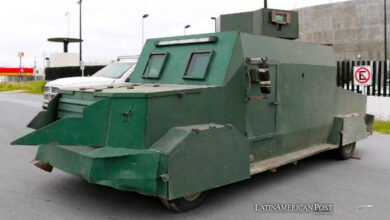In response to the invasion of Ukraine, Several countries have imposed harsh sanctions on Russia that could harm the entire world, especially, Maduro, Díaz-Canel, and Ortega.

Photo: TW-NicolasMaduro
”.
LatinAmerican Post | Nicolás Donoso Álvarez
The Russian invasion of Ukraine has left scars that involve political, social, territorial, and economic areas. In this context, the role of the United States and the European Union trying to wear down and restrain the Russians has meant imposing economic sanctions whose main objective is to penalize, restrict and punish Russia economically. This is in order to stop the Russian attempt to continue with its purposes, mainly in Donbas.
It should be noted that penalties are usually imposed on a country to undermine its economy and that of its citizens, and damaging to the point that the nation in question is seen in the urgent need to retract the position it has about a conflict.
For this reason, the harshest sanctions for Russia have been the closure of the Moscow stock market, its expulsion from the SWIFT (Society for Worldwide Financial and Interbank Communications) financial transactions system, the freezing of assets, and the prohibition of visas and some restrictions on exports that can be made to Russia.
In this scenario, the fact that the United States, the United Kingdom, and the European Union have decided to exclude certain Russian banks from the SWIFT financial transaction system means that Russia will be momentarily isolated from this system at an international level, and this will reduce its possibilities of negotiating and delay the payments it receives for the export of oil and gas, two of its main raw materials.
Likewise, the closure of the stock market in Moscow has been another of the harshest penalties that Russia faces. It must be remembered that the stock market has been closed since February 28 to prevent the fall of the main values and that is understood as a response to the severe sanctions that the West has imposed on it.
In the same way, the restriction about the products that can or cannot be sent to Russia also takes on a certain role. And it is that the United States, the United Kingdom, and the European Union have limited the articles that can reach Russia, prohibiting those that have a dual-use such as chemical materials or advanced technology, since it is considered that these could be used in the current conflict.
Despite the above, the Kremlin spokesman, Dmitri Peskov, although pointed out that the Russian economy is going through a difficult time, it will be sustained over time. “Of course, Russia is under great pressure from economic sanctions, it is taking a major hit, I would say. There is a reserve of solidity, there is potential, there are plans, it is working energetically. The economy will stay on its feet.”
However, according to David Feldman, an economics professor from William and Mary University of Virginia, the Russian economy may be affected if the situation continues to escalate. “This is going to hit the economy fast. Everything imported is going to see a sharp price increase due to the increase in the exchange rate. The only way to avoid this would be through massive subsidies.”
Desde Venezuela, apoyamos firmemente las negociaciones entre Rusia y Ucrania, aspirando a resultados favorables que restablezcan la Paz y la tranquilidad en esa región. Igualmente, repudiamos las sanciones y la acuciosa campaña mediática contra el pueblo ruso. ¡Pedimos Paz! pic.twitter.com/YQmjmMH3Dk
— Nicolás Maduro (@NicolasMaduro) March 3, 2022
How does it affect its Latin American allies?
It is no secret to anyone that Latin American countries such as Venezuela, Nicaragua, and Cuba have supported Russia for many years and vice versa. Well, this time has not been the exception and all these nations have lined up to support Russia’s position and join countries from other latitudes such as North Korea, Belarus, Tajikistan, and Armenia.
But beyond that, it should be noted that these Latin American countries have had an extremely close relationship with Russia. In fact, according to official information from the Russian Government and at the request of Vladimir Putin, last year Russia donated 88 tons of humanitarian aid to Cuba; where basic food, nearly a million masks, and personal protective equipment were included in the midst of one of the waves with the most daily cases of covid-19 that crossed the island at the time.
The support has been such that, in the case of Nicaragua, in 2020 the Daniel Ortega regime made it official that Russia, through the World Food Program (WFP), gave the Central American country five million dollars to pay for the food of nearly 200,000 students in vulnerable situations.
Regarding Venezuela, according to the German chain Deutsche Welle (DW), in recent years Russia has delivered military weapons to Venezuela, including helicopters, fighter planes, and tanks. All are valued at more than 10,000 million dollars.
Given Russia’s close relationship with the aforementioned Latin American countries, these could be greatly affected by the economic sanctions that have been imposed on the country led by Vladimir Putin. And it is that Russia does not seem to skimp on expenses and efforts and that could mean great economic losses, which could prevent it from continuing to help many countries.
In addition, if Russia cannot export its main raw materials (oil and natural gas), the supply could be reduced internationally and the price of both products could increase. This would benefit some nations on the continent such as Venezuela and Colombia but would harm others such as Chile and Mexico. However, it is about the consequences of a conflict about which there are more doubts than certainties.





